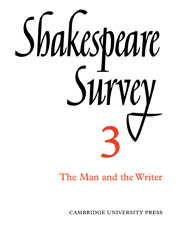Book contents
- Frontmatter
- Studies in the Life and Environment of Shakespeare Since 1900
- Shakespeare’s Deposition in the Belott-Mountjoy Suit
- Shakespeare’s Reading
- Recent Studies in Shakespeare’s Chronology
- Coriolanus and the Midlands Insurrection of 1607
- The Shakespeare Collection in the British Museum
- The Structural Pattern of Shakespeare’s Tragedies
- The ‘Meaning’ of Measure for Measure
- Hamlet and the Player Who Could NOT Keep Counsel
- Unworthy Scaffolds: A Theory for the Reconstruction of Elizabethan Playhouses
- Shakespeare in the German Open-Air Theatre
- Othello in Paris and Brussels
- Shakespeare and Denmark: 1900–1949
- International News
- A Stratford Production: Henry VIII
- The Year's Contributions to Shakespeare Studies: 1 Critical Studies
- 2 Shakespeare’s Life and Times
- 3 Textual Studies
- Index
- Plate Section
Recent Studies in Shakespeare’s Chronology
Published online by Cambridge University Press: 28 March 2007
- Frontmatter
- Studies in the Life and Environment of Shakespeare Since 1900
- Shakespeare’s Deposition in the Belott-Mountjoy Suit
- Shakespeare’s Reading
- Recent Studies in Shakespeare’s Chronology
- Coriolanus and the Midlands Insurrection of 1607
- The Shakespeare Collection in the British Museum
- The Structural Pattern of Shakespeare’s Tragedies
- The ‘Meaning’ of Measure for Measure
- Hamlet and the Player Who Could NOT Keep Counsel
- Unworthy Scaffolds: A Theory for the Reconstruction of Elizabethan Playhouses
- Shakespeare in the German Open-Air Theatre
- Othello in Paris and Brussels
- Shakespeare and Denmark: 1900–1949
- International News
- A Stratford Production: Henry VIII
- The Year's Contributions to Shakespeare Studies: 1 Critical Studies
- 2 Shakespeare’s Life and Times
- 3 Textual Studies
- Index
- Plate Section
Summary
Shakespeare’s first formal editor, Nicholas Rowe, was mildly interested in the problem of chronology, but lacked the equipment and the intellectual curiosity to solve it. “It would be without a doubt”, he wrote in 1709, “a pleasure to any man, curious in things of this kind, to see and know what was the first essay of a fancy like Shakespeare’s. Perhaps we are not to look for his beginnings, like those of other writers, among their least perfect writings, art had so little, and nature so large a share in what he did, that, for aught I know, the performances of his youth, as they were the most vigorous, and had the most fire and strength of imagination in them, were the best.” To which Dr Johnson wisely replied in 1765 that “Shakespeare, however favoured by nature, could impart only what he had learned; and as he must increase his ideas, like other mortals, by gradual acquisition, he, like them, grew wiser as he grew older, could display life better, as he knew it more, and could instruct with more efficacy, as he was himself more amply instructed”.
- Type
- Chapter
- Information
- Shakespeare Survey , pp. 22 - 33Publisher: Cambridge University PressPrint publication year: 1950



